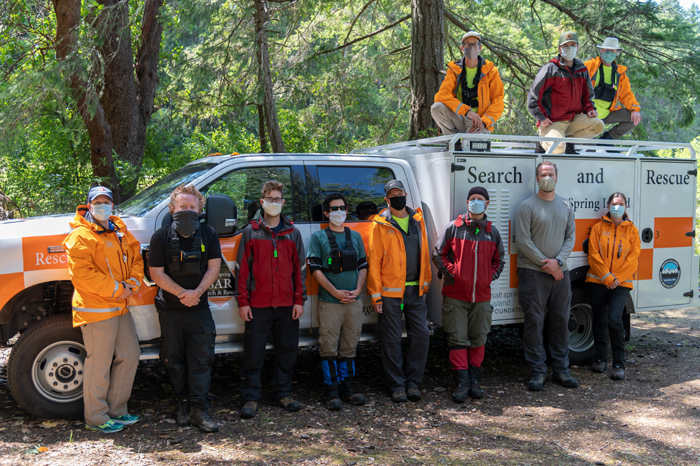BY CHRIS ROWTHORN
SPECIAL TO THE DRIFTWOOD
Even in these unusual times, life goes on: people still go hiking, climb mountains, get lost, and get injured. Fortunately, even during this pandemic, Salt Spring Island Search and Rescue has continued working and has even managed to train a new crop of five team members. The five trainees, known as members-in-training or MITs, are expected to graduate at the end of this month.
Salt Spring Search and Rescue, or SSISAR, has been in existence since 1989 and currently comprises 38 members. Members range in age from 20-somethings to 70-somethings and come from all walks of life. Women make up a significant number of members and are actively welcomed by the team.
Naturally, SSISAR responds to a variety of calls on Salt Spring itself, ranging from lost hikers in Ruckle Park to individuals with dementia who have wandered away from care facilities. SSISAR also performs non-search tasks like notifying pod residents of evacuation orders, and, following the windstorm of December 2018, they did wellness checks of housebound island residents and delivered vital supplies. SSISAR is also responsible for searches and rescues on the other southern Gulf Islands.
Of course, there aren’t that many incidents that require searches in the southern Gulf Islands, and much of SSISAR’s work involves offering assistance to other SAR organizations in the province of B.C. These so-called “mutual aid” missions frequently take the team to Vancouver Island, but they also participate in searches all across mainland B.C.
SSISAR usually trains new members once a year. Training takes about six months, with two-hour meetings held once or twice a week. Training covers all aspects of search and rescue and includes such topics as wilderness survival, compass and GPS skills, map reading, radio work, search techniques, tracking, rope skills and evacuation techniques. SAR members are also required to complete a basic first aid course. There are plenty of opportunities for members to deepen their knowledge of particular skills, and senior members offer excellent and supportive mentorship.
This year’s crop of five MITs underwent training in circumstances utterly different from those of previous years. Even book-based training was often held outdoors, and social distancing and hygiene regulations were strictly adhered to. Despite the unusual circumstances, the group came through their training with flying colours.
Conrad Bowden, a senior member who’s been training the new recruits, says, “This years MITs are very solid. They have shown commitment and enthusiasm for the training and an ability to work independently and cooperatively. They are fit and capable, like being outdoors, and like engaging in practical tasks.”
So why do people decide to join SSISAR? Adam Geddes, a recent transplant to the island from Vancouver, says, “I was first exposed to the SAR world a number of years ago by a first-aid instructor. During our class a few search and rescue stories worked their way into scenarios and conversation. After that course the idea of joining a SAR group was always in the back of my mind. When my wife and I made the decision to relocate from Vancouver, that same day I emailed SSISAR and asked about joining! It was a way to connect with locals who knew the island and to help integrate myself after moving to a new community.”
Another MIT, Adam Lynes-Ford, saw a search and rescue team in action and that spurred his interest.
He says, “When I was a kid we spent a lot of time adventuring around outside on the island. I never gave a thought to getting lost or stuck outside until one of my friends got stuck up one of the cliffsides we liked to climb around on. Search and Rescue came and got him down, and the resourceful and helpful volunteers made an impression on me.”
What do MITs get out of their training? Sam Moore, another MIT, reports, “Training has taught me valuable navigation skills and has been a great place to practise critical thinking. As a bonus, outside of SAR tasks, it has made me more confident in the outdoors.”
Another new member, Dan Snowsill, says that SAR gave him “an introduction to a range of skills I never knew I needed. I also got to meet some great people I didn’t know on the island and got to know a few people better.”
SSISAR is always looking for new members. SAR manager and training officer Zeke Blazecka says, “Those that like being outdoors, as part of a team of like-minded individuals, will find a high level of satisfaction helping others within the search and rescue mandate.”
Anyone interested in SSISAR should start by visiting the website at https://saltspringsar.org/.

